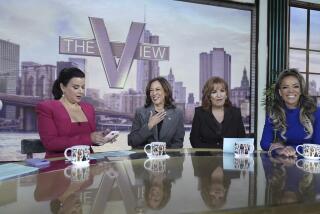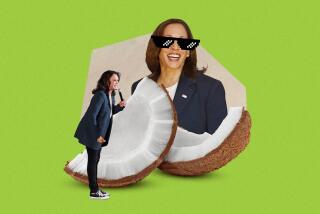Tops in political toolbox: Internet
- Share via
WASHINGTON — In choosing the Internet to announce she intends to run for the presidency in 2008, Sen. Hillary Rodham Clinton bowed to the burgeoning political power of the medium and offered a preview of how she hopes to harness it to her purposes.
In declaring “I’m in” the White House race in a video clip on her new campaign website, HillaryClinton.com, the New York Democrat did considerably more than simply appear before the cameras; she invited supporters to join an almost Oprah Winfrey-like session of give and take.
“Let’s talk. Let’s chat. Let’s start a dialogue about your ideas and mine.... “ she told viewers.”With a little help from modern technology, I’ll be holding live online video chats ... starting Monday.”
By doing this, Clinton signaled her intention of using the Internet to shore up one of her chief political weak points, what independent analyst Charlie Cook called the caricature of her as “this shrill, raving, partisan, liberal lunatic.”
“She needs to build people’s comfort level with her, and she’s going to do that with [an Internet] conversation,” Cook said.
Clinton’s online declaration that she is forming a presidential exploratory committee came less than a week after similar news delivered online by Sen. Barack Obama (D-Ill).
It also follows even more elaborate use of the Internet by the third major presidential contender in the Democratic ranks, former Sen. John Edwards of North Carolina.
The website for Edwards, the party’s vice presidential nominee in 2004, offers documentary-style video of him grousing about his political consultants and informally chatting about the campaign ahead.
The Internet’s power both to make and break politicians has been vividly demonstrated in recent years.
In 2004, former Vermont Gov. Howard Dean jumped from political obscurity to grab the front-runner’s position in the initial stages of the Democratic race largely on the strength of the interest and fundraising he generated online.
Last year, Sen. George Allen (R-Va.) watched his reelection campaign -- and his hopes of emerging as a prime contender for the GOP presidential nomination -- go down in flames after a video clip of him addressing a young man of Indian descent as “macaca” made the rounds on the Web.
Barely a factor in campaigning 11 years ago when Clinton’s husband won reelection as president, the Internet has become an integral part of the political landscape, with every major candidate fielding a website and seeking to create a virtual community around his -- or her -- campaign.
But with the recent advent of YouTube and other video-sharing sites, analysts said the most intriguing aspect of the evolving use of the Web may be as part of an immense game of political “gotcha,” in which campaigns seek to catch opposing candidates off-guard and off-message, as happened to Allen.
Analysts said Clinton’s announcement and the accompanying rollout of her campaign website underscore the well-organized nature of her bid.
In addition to the video clip, the site includes a political analysis of recent polls suggesting she can win, as well as invitations to contribute and sponsor local events to support her.
“This is an example of what’s to come,” Cook said. “It has lots of bells and whistles. There’s nothing left to chance.”
More to Read
Get the L.A. Times Politics newsletter
Deeply reported insights into legislation, politics and policy from Sacramento, Washington and beyond. In your inbox twice per week.
You may occasionally receive promotional content from the Los Angeles Times.










